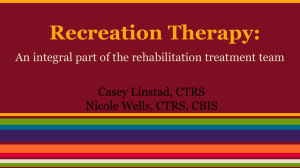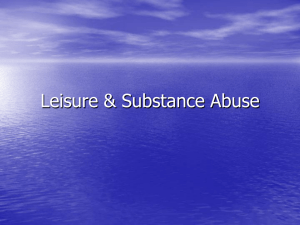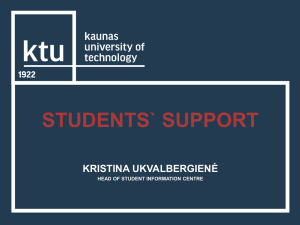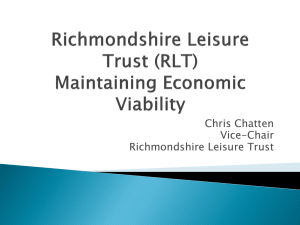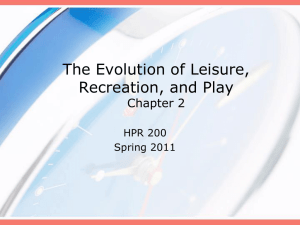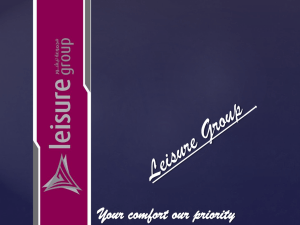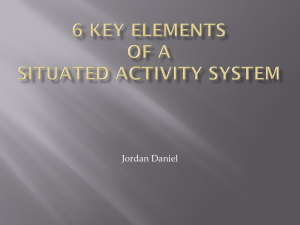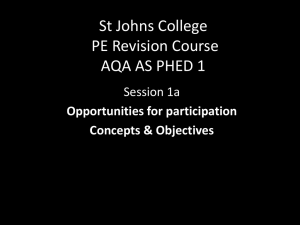Investing in Leisure Literacy
advertisement
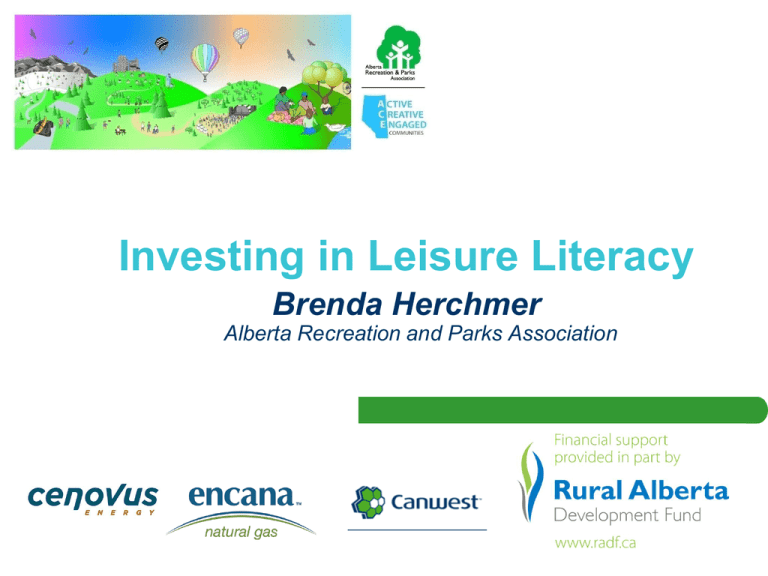
Investing in Leisure Literacy Brenda Herchmer Alberta Recreation and Parks Association Session Outcomes Participants will leave the session better able to: Define recreation, leisure, & leisure literacy & understand why it’s relevant to Kids at Hope Reflect & learn from our own leisure choices Articulate the benefits of recreation Describe a process and potential tools & resources for facilitating leisure literacy and informed, meaningful choices 2 What do you do for 3 Does Your Answer Change with this Definition of Recreation? “All those things that a person or group chooses to do in order to make their leisure time more interesting, more enjoyable and more personally satisfying". Canadian National Recreation Statement Using this definition, turn to the person beside you and share what you do for recreation. Also share 3 words that describe how it makes you feel? 4 Benefits of Recreation www.benefitshub.ca sense of belonging social and emotional wellbeing reduced stress creative expression leadership skills reduced health risks quality of life enhanced learning education performance confidence and selfesteem civic responsibility 6 So What is Leisure? some measure of time from which a person is released from responsibilities which normally or routinely pertain to the duties they are compelled to perform personally to be able to act in ways which are pleasing and intuitively worthwhile provides us choice i.e. “freedom from” and “freedom to” 7 Definitions of both Recreation & Leisure contain the element of choice -- either an activity or nonactivity which deviates from the normal or routine structure of compulsory activity -- and the element of satisfaction, by way of some attribute which the individual finds positive or pleasing. 8 Recreation & Leisure Can Be: Active or Passive Alone or with others Indoor or Outdoor Participatory or Spectator Fee or Free Planned or Spontaneous Others? For life balance; variety is recommended Another Way of Thinking About Recreation… “…recreation is a social service in the same way that health and education are considered as social services and that recreation's purpose should be: (a) to assist Individual and community development; (b) to improve the quality of life; (c) to enhance social functioning. Such recognition will indicate the constitutional responsibility of the Provinces and Territories in recreation services.“ Canadian National Recreation Statement 10 DECLARATION OF THE RIGHTS OF THE CHILD Adopted by UN General Assembly Resolution 1386 (XIV) of 10 December 1959 The child shall have full opportunity for play and recreation, which should be directed to the same purposes as education; society and the public authorities shall endeavour to promote the enjoyment of this right. 11 What is Leisure Literacy? (or Leisure Education) Ensures children, youth, and adults are aware of leisure and its value Ensures we are prepared to make choices that increase our options for personally satisfying, quality experiences in leisure Enables individuals to be self-determining, selfsufficient, and proactive in relation to their leisure lives 12 Relevance To Kids at Hope FOUR ACES or ELEMENTS OF SUCCESS ACE of Hearts - anchor parent ACE of Clubs - all other caring adults ACE of Spades - treasure hunter ACE of Diamonds - adults who facilitate children’s pathways to success 13 Relevance To Kids at Hope Destinations •Home & Family •Education & Career •Community & Service •Hobbies & Recreation 14 Relevance to Development & Growth Play 3-6 Explore 7-12 Growth 12-19 Focus Outcome • Social • Interaction • Imagination • Self Starter • Self Control • Resilience • Competence • Identity • Group • Thinking Abstract • Make Judgments • Apply Strategies • Individual • Interests • Self discovery • Hypocritical and deductive reasoning • Growth • Independence 15 Components of Leisure Literacy Knowledge and Awareness of Leisure Positive Attitudes Toward Leisure Awareness of Resources for Leisure Self Awareness, Interests, Needs & Constraints Values Skills for Participation Decision Making Knowledge and Skills Increasing Our Knowledge & Awareness of Leisure The Resource: Alphabet Challenge Recreation / Leisure Activities Recreation / Leisure Settings Outcomes / Benefits of Leisure Explore Your Interests Easily understood A good starting point Often the carrot that draws people in Can be something that connects people By itself does not necessarily make a good activity choice See Activity Interest Inventory Identifying Individual Needs Each of us has hundreds of personal needs Needs can be met through school, play, recreation, work, relationships Unmet needs motivate us to action Having needs may not mean we know what they are or that we can articulate them Maslow’s Hierarchy of Needs, Developmental Assets and others See “Needs Assessment Tools” Decision Making Model for Leisure Interests Values Values Constraints YOU Needs Resources Values Petersen, C (1981.2000) Your Role Facilitate opportunities/teachable moments to learn Support others in this role Recognize that learning occurs across the lifecycle Encourage a wide range of leisure opportunities – Arts – Hobbies – Sports – Community Service – Dance – Outdoors – Fitness 21
